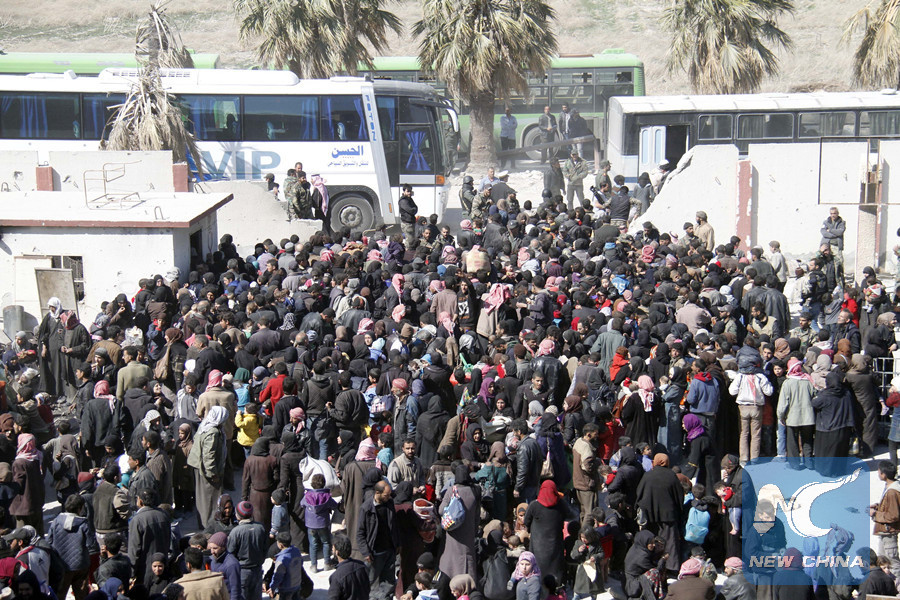
People gather to be transferred from a temporary shelter in the Housh Nasri area, east of Damascus, capital of Syria, to better shelters near Damascus, on March 16, 2018. (Xinhua/Hummam Sheikh Ali)
DAMASCUS, March 16 (Xinhua) -- Ayham Khatib, a soldier serving in the Syrian army, couldn't see his family in the past seven years of war in the country, as his father and brothers remained stuck in the rebel-held areas in Eastern Ghouta countryside of the capital Damascus.
Despite a few kilometers from his family in Eastern Ghouta, Khatib was lonely, as it felt like they were on another planet.
"My family was insulted inside and I was feeling the insult because my family was far from me as, without a family, one could be worthless," he told Xinhua.
The young soldier said it was even difficult for them to communicate by phone, as the rebels in Eastern Ghouta discriminated against his family because of his capacity as a soldier in the government army.
But all these painful years are gone as civilians in Eastern Ghouta have recently been allowed to leave in droves, reaching the government-controlled towns near Damascus for the first time in years.
When hearing the news, Khatib rushed to the gathering points searching for his relatives. Luckily enough, the man found his father and brother, calling the dramatic reunion "indescribable."
"I have been running around searching for them and when I found them it was an indescribable feeling. It's like when a thirsty man in the desert found water," he said.
His father, an old man in his 70s, described the life under the rebel control as hellish, saying he was discriminated and even prevented from getting aid because his son is a soldier.
"I was living in a very bad situation in Eastern Ghouta where I was humiliated and without dignity. The rebels destroyed our lives and I was subject to more humiliation because my son is a soldier," he told Xinhua.
"I was reborn again today when I reunited with my son," the old man said happily.
Khatib is just one of many soldiers who were forced to get separated from their families in Eastern Ghouta.
At the Housh Nasri area in Eastern Ghouta on Friday, hugs and kisses between the family members could be seen everywhere, while the evacuees were sitting on the ground in an old school, waiting for the authorities to transfer them to shelters nearby.
Their faces were covered with soot, and many children were barefooted, after a "hellish" journey in their struggle to flee rebel-held areas.
Saed Doumani, a man in his 30s, told Xinhua that he misses Damascus as he couldn't leave Eastern Ghouta over the past years of war.
"I miss every place in Damascus. It's been almost seven years and I am so excited I would be able to visit Damascus soon," he said.
A man next to him, who only identified himself as Muhammad, said he feels happy that his daughter can pursue her schooling again, as she has been without proper education for more than six years.
Earlier in the day, the Syrian army said in a statement that it had captured 70 percent of rebel-held areas in Eastern Ghouta.
Thousands of people have fled Eastern Ghouta through humanitarian corridors set up by the Syrian army in the region, it added.
The army called on the people to leave the rebel-held areas in Eastern Ghouta, highlighting its resolve to continue fighting till security is restored to entire Syria.
Meanwhile, Bashar al-Jaafari, Syria's permanent representative to the UN, said 40,000 people were evacuated from Eastern Ghouta on Thursday alone.
Eastern Ghouta, a 105-square-km agricultural region consisting of several towns and farmlands, constitutes the last threat to Damascus given its proximity to government-controlled neighborhoods east of the capital and continuing mortar attacks on residential areas there.
Four major rebel groups are currently positioned inside Eastern Ghouta, namely the Islam Army, Failaq al-Rahman, Ahrar al-Sham, and the Levant Liberation Committee, known as the al-Qaida-linked Nusra Front.
The UN humanitarian agencies have sounded the alarm about the worsening humanitarian situation for 400,000 people in Eastern Ghouta, where activists said around 1,000 have been killed since a military showdown between rebels and the government late February.

